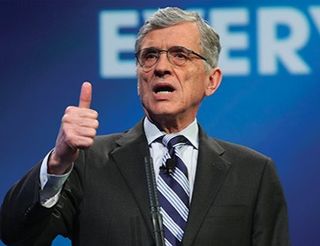5G, Competition Top Wheeler's Agenda at CTIA

To no one's surprise, "competition" was at the core of the keynote address that FCC chairman Tom Wheeler delivered at the CTIA "Super Mobility" conference in Las Vegas on Wednesday.
Coupling it with the emerging fifth-generation (5G) mobile technology, Wheeler posed a rhetorical question.
“What do we need to do seize the 5G opportunity?” he asked, then quickly responded, "The answer, of course, starts with competition."
Citing the role of the "four nationwide carriers" that dominate the wireless industry, Wheeler said, "Our focus must be on continuing to promote a competitive marketplace."
5G dominated his remarks. "5G is not a technology. It is a revolution," he said.
"Continued vigilance is required to ensure that there is no diminution in competition as result of technological or marketplace developments," he continued.
Wheeler opened his remarks with references to his 12 years as CTIA president more than a decade ago. Recalling "the 'Vision of the Wireless Future' we used to talk about," Wheeler cited the value of "ultra-high-speed, high-capacity, low-latency, secure mobile connectivity."
Broadcasting & Cable Newsletter
The smarter way to stay on top of broadcasting and cable industry. Sign up below
"That's what 5G delivers," he said, then asked, "What do we need to do to seize the 5G opportunity?”
"A light-touch regulatory approach, as embodied in Section 332 of the Communications Act, is conducive to innovation and investment," he answered. "We should forbear from rules like rate regulation that don’t make sense for the kind of services offered, while preserving the right to throw the flag if needed to protect consumers and competition."
Wheeler focused on "three keys" for FCC policy "to help unlock the 5G opportunity." His speech offered details to ensure ample spectrum availability, to foster competitive infrastructure provision (especially for backhaul for Internet of Things micro-cells) and to remove "unnecessary hurdles to [antenna] siting."
"We [will] keep the pedal down on making more high-band spectrum available for 5G," Wheeler promised.
Noting that 5G will need "a lot more cells, particularly at the higher frequencies, he vowed to assure competition in backhaul delivery.
He also said that "before the end of this year" the FCC will deal with the ongoing Business Data Services proposal to ensure that "lack of competition in some places cannot be used to hold 5G hostage."
"There must be fair backhaul prices and availability if we are to connect all these small cells," Wheeler said. In addition, he envisioned that the FCC and industry will collaborate on a mission to "help leaders at the local level – and all levels for that matter – understand that 5G will make the Internet of Things real."
"But even talking about IoT is too obtuse," Wheeler observed. "Let’s talk about the benefits of smart-city energy grids, safer transportation networks and new opportunities to improve health care."
As for infrastructure development, Wheeler said he is "not endorsing shared infrastructure in every and all circumstances, and certainly not opening a door to consolidation."
Again citing the dominance of four wireless carriers nationwide, Wheeler suggested, "we ought to explore creative options on how best to build that infrastructure."
Contributor Gary Arlen is known for his insights into the convergence of media, telecom, content and technology. Gary was founder/editor/publisher of Interactivity Report, TeleServices Report and other influential newsletters; he was the longtime “curmudgeon” columnist for Multichannel News as well as a regular contributor to AdMap, Washington Technology and Telecommunications Reports. He writes regularly about trends and media/marketing for the Consumer Technology Association's i3 magazine plus several blogs. Gary has taught media-focused courses on the adjunct faculties at George Mason University and American University and has guest-lectured at MIT, Harvard, UCLA, University of Southern California and Northwestern University and at countless media, marketing and technology industry events. As President of Arlen Communications LLC, he has provided analyses about the development of applications and services for entertainment, marketing and e-commerce.

